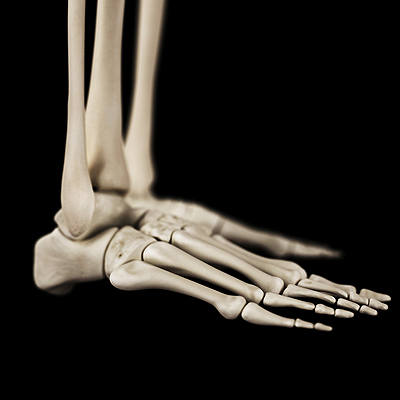Connect With Us
Blog
Items filtered by date: September 2017
What Do Podiatrists Do?
 Podiatrists are medical doctors who specialize in the foot and ankle. Officially known as a Doctor of Podiatric Medicine (DPM), podiatrists have the knowledge and ability to diagnose and treat any foot ailment. This includes minor ones such as toenail fungus, cracked heels, and heel pain, to more major problems such as an Achilles tendon rupture or a broken foot. They can also provide items such as custom-made orthotics to help give your feet proper support and keep them aligned. For those with diabetes, it is highly recommended to see a podiatrist. Diabetics generally have reduced blood flow and neuropathy in the foot, which in their worst cases can lead to infected ulcers and an increased risk of amputation. If you are experiencing any pain or have any foot abnormalities, it is important to see a podiatrist.
Podiatrists are medical doctors who specialize in the foot and ankle. Officially known as a Doctor of Podiatric Medicine (DPM), podiatrists have the knowledge and ability to diagnose and treat any foot ailment. This includes minor ones such as toenail fungus, cracked heels, and heel pain, to more major problems such as an Achilles tendon rupture or a broken foot. They can also provide items such as custom-made orthotics to help give your feet proper support and keep them aligned. For those with diabetes, it is highly recommended to see a podiatrist. Diabetics generally have reduced blood flow and neuropathy in the foot, which in their worst cases can lead to infected ulcers and an increased risk of amputation. If you are experiencing any pain or have any foot abnormalities, it is important to see a podiatrist.
If you are experiencing pain in the feet or ankles, don’t join the stubborn majority refusing treatment. Feel free to contact Dr. David Ungar from Personal Foot Care. Our doctor can provide the care you need to keep you pain-free and on your feet.
What Is a Podiatrist?
Someone would seek the care of a podiatrist if they have suffered a foot injury or have common foot ailments such as heal spurs, bunions, arch problems, deformities, ingrown toenails, corns, foot and ankle problems, etc.
Podiatric Treatment
A podiatrist will treat the problematic areas of the feet, ankle or lower leg by prescribing the following:
- Physical therapy
- Drugs
- Orthotic inserts or soles
- Surgery on lower extremity fractures
A common podiatric procedure a podiatrist will use is a scanner or force plate which will allow the podiatrist to know the designs of orthotics. Patients are then told to follow a series of tasks to complete the treatment. The computer will scan the foot a see which areas show weight distribution and pressure points. The podiatrist will read the analysis and then determine which treatment plans are available.
If you have any questions please feel free to contact our office located in Farmington, MI . We offer the newest diagnostic and treatment technologies for all your foot and ankle needs.
Pregnancy and Swollen Feet
 Swollen feet among pregnant women is a very common and normal condition. However, it can be very uncomfortable for women and should be monitored closely. The feet become swollen most often in the third trimester due to increased blood pressure and fluids in the lower body. The swelling tends to worsen during the day but can decrease or go away after a night of sleep. Sometimes, the swelling can spread to other parts of the body such as the thighs, hands and face. If the swelling spreads, it is important to see a doctor, as this could be a sign of potentially serious conditions. While you can’t get rid of swollen feet, consuming less salt, avoiding the consumption of too much liquid, and getting enough vitamins can help reduce the swelling. If your feet are swollen and are causing you pain, it is recommended to see a podiatrist for treatment.
Swollen feet among pregnant women is a very common and normal condition. However, it can be very uncomfortable for women and should be monitored closely. The feet become swollen most often in the third trimester due to increased blood pressure and fluids in the lower body. The swelling tends to worsen during the day but can decrease or go away after a night of sleep. Sometimes, the swelling can spread to other parts of the body such as the thighs, hands and face. If the swelling spreads, it is important to see a doctor, as this could be a sign of potentially serious conditions. While you can’t get rid of swollen feet, consuming less salt, avoiding the consumption of too much liquid, and getting enough vitamins can help reduce the swelling. If your feet are swollen and are causing you pain, it is recommended to see a podiatrist for treatment.
Pregnant women with swollen feet can be treated with a variety of different methods that are readily available. For more information about other cures for swollen feet during pregnancy, consult with Dr. David Ungar from Personal Foot Care. Our doctor will attend to all of your foot and ankle needs.
What Foot Problems Can Arise During Pregnancy?
One problem that can occur is overpronation, which occurs when the arch of the foot flattens and tends to roll inward. This can cause pain and discomfort in your heels while you’re walking or even just standing up, trying to support your baby.
Another problem is edema, or swelling in the extremities. This often affects the feet during pregnancy but tends to occur in the later stages.
How Can I Keep My Feet Healthy During Pregnancy?
- Wearing orthotics can provide extra support for the feet and help distribute weight evenly
- Minimize the amount of time spent walking barefoot
- Wear shoes with good arch support
- Wear shoes that allow for good circulation to the feet
- Elevate feet if you experience swelling
- Massage your feet
- Get regular, light exercise, such as walking, to promote blood circulation to the feet
If you have any questions please feel free to contact our office located in Farmington, MI . We offer the newest diagnostic and treatment technologies for all your foot and ankle needs.
What are Stress Fractures and Ways to Prevent Them
 Stress fractures, or painful hairline fractures of the bone caused by fatigue, can happen to anyone. While small, they can be serious if not taken care of. Treatment generally involves rest, but prevention is always preferential. To prevent stress fractures, start with upping your calcium and vitamin D intake. Both calcium and vitamin D help promote healthy bones, which can prevent fractures. A good pair of sneakers can help prevent stress fractures in addition to a number of other foot injuries. At least one study shows that improper running stride can increase the likelihood of injury. Those who are very skinny are more likely to suffer from fractures, so maintaining a healthy body weight and diet is essential. Last but not least, when exercising be sure to gradually increase intensity over time; do not do this immediately. Fatigue from overuse is a common cause for stress fractures, so knowing your limit is an important part of preventing injury. If you think you have suffered a stress fracture in the foot, see a podiatrist immediately for a proper diagnosis.
Stress fractures, or painful hairline fractures of the bone caused by fatigue, can happen to anyone. While small, they can be serious if not taken care of. Treatment generally involves rest, but prevention is always preferential. To prevent stress fractures, start with upping your calcium and vitamin D intake. Both calcium and vitamin D help promote healthy bones, which can prevent fractures. A good pair of sneakers can help prevent stress fractures in addition to a number of other foot injuries. At least one study shows that improper running stride can increase the likelihood of injury. Those who are very skinny are more likely to suffer from fractures, so maintaining a healthy body weight and diet is essential. Last but not least, when exercising be sure to gradually increase intensity over time; do not do this immediately. Fatigue from overuse is a common cause for stress fractures, so knowing your limit is an important part of preventing injury. If you think you have suffered a stress fracture in the foot, see a podiatrist immediately for a proper diagnosis.
Activities where too much pressure is put on the feet can cause stress fractures. To learn more, contact Dr. David Ungar from Personal Foot Care. Our doctor can provide the care you need to keep your pain free and on your feet.
Dealing with Stress Fractures of the Foot and Ankle
Stress fractures occur in the foot and ankle when muscles in these areas weaken from too much or too little use. The feet and ankles then lose support when walking or running from the impact of the ground. Since there is no protection, the bones receive the full impact of each step. Stress on the feet can cause cracks to form in the bones, thus creating stress fractures.
What Are Stress Fractures?
Stress fractures occur frequently in individuals whose daily activities cause great impact on the feet and ankles. Stress factors are most common among:
- Runners
- People affected with Osteoporosis
- Tennis or basketball players
- Gymnasts
- High impact workouts
Symptoms
Pain from the fractures occur in the area of the fractures and can be constant or intermittent. It will often cause sharp or dull pain with swelling and tenderness. Engaging in any kind of activity which involves high impact will aggravate pain.
If you have any questions please feel free to contact our office located in Farmington, MI . We offer the newest diagnostic and treatment technologies for all your foot and ankle needs.
When Choosing Children’s Footwear, Fit Comes Before Fashion
 When it comes to choosing children’s footwear, children often favor style over comfort. This can cause a number of foot issues; children’s feet are still developing, and poorly fitted footwear can stymie growth. It is recommended to wear fitted shoes that not only offer some flexibility, but provide support and cushioning as well. The toes should have enough space to move around, and the foot shouldn’t be cramped. Too much space, however, is also bad and can lead to injury. Parents should keep an eye on their children’s feet; if they complain about foot pain, it may be wise to take them to a podiatrist. Fashion and style have their place in choosing footwear, but it shouldn’t be at the cost of healthy feet.
When it comes to choosing children’s footwear, children often favor style over comfort. This can cause a number of foot issues; children’s feet are still developing, and poorly fitted footwear can stymie growth. It is recommended to wear fitted shoes that not only offer some flexibility, but provide support and cushioning as well. The toes should have enough space to move around, and the foot shouldn’t be cramped. Too much space, however, is also bad and can lead to injury. Parents should keep an eye on their children’s feet; if they complain about foot pain, it may be wise to take them to a podiatrist. Fashion and style have their place in choosing footwear, but it shouldn’t be at the cost of healthy feet.
Making sure that your children maintain good foot health is very important as they grow. If you have any questions, contact Dr. David Ungar of Personal Foot Care. Our doctor can provide the care you need to keep you pain-free and on your feet.
Keeping Children's Feet Healthy
Having healthy feet during childhood can help prevent medical problems later in life, namely in the back and legs. As children grow, their feet require different types of care. Here are some things to consider...
Although babies do not walk yet, it is still very important to take care of their feet.
Avoid putting tight shoes or socks on his or her feet.
Allow the baby to stretch and kick his or her feet to feel comfortable.
As a toddler, kids are now on the move and begin to develop differently. At this age, toddlers are getting a feel for walking, so don’t be alarmed if your toddler is unsteady or ‘walks funny’.
As your child gets older, it is important to teach them how to take care of their feet.
Show them proper hygiene to prevent infections such as fungus.
Be watchful for any pain or injury.
Have all injuries checked by a doctor as soon as possible.
Comfortable, protective shoes should always be worn, especially at play.
If you have any questions please feel free to contact our office located in Farmington, MI . We offer the newest diagnostic and treatment technologies for all your foot and ankle needs.
